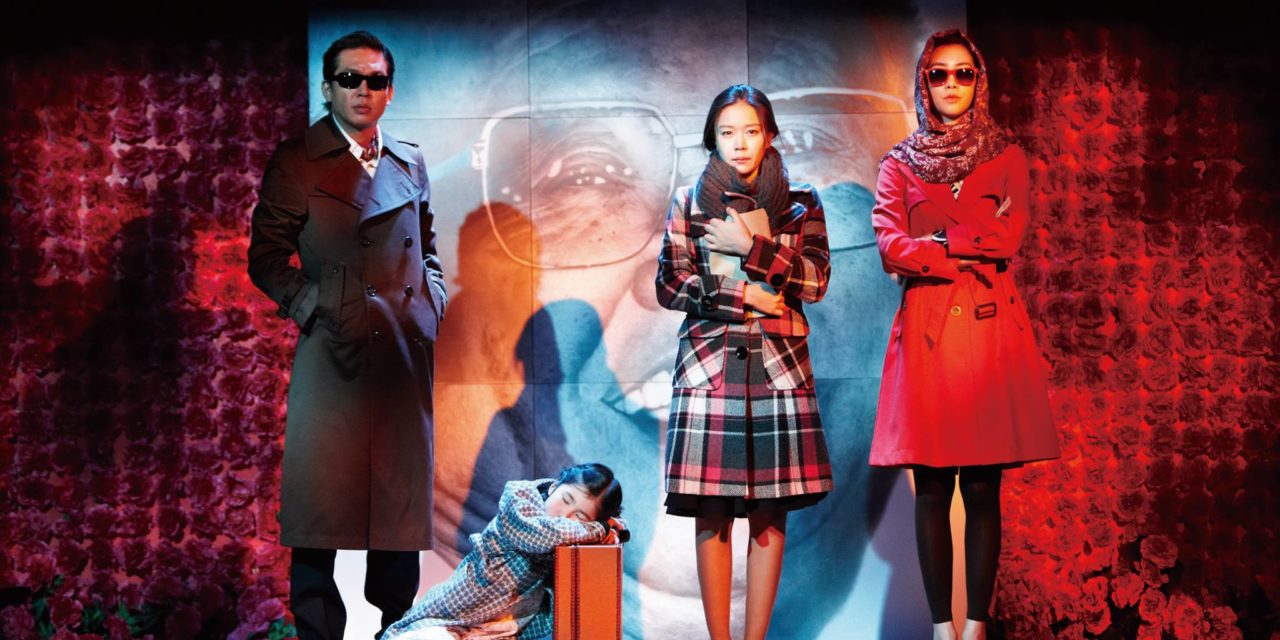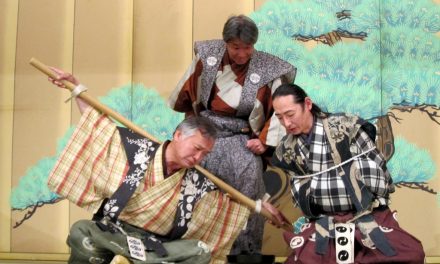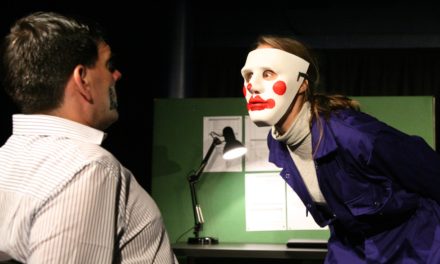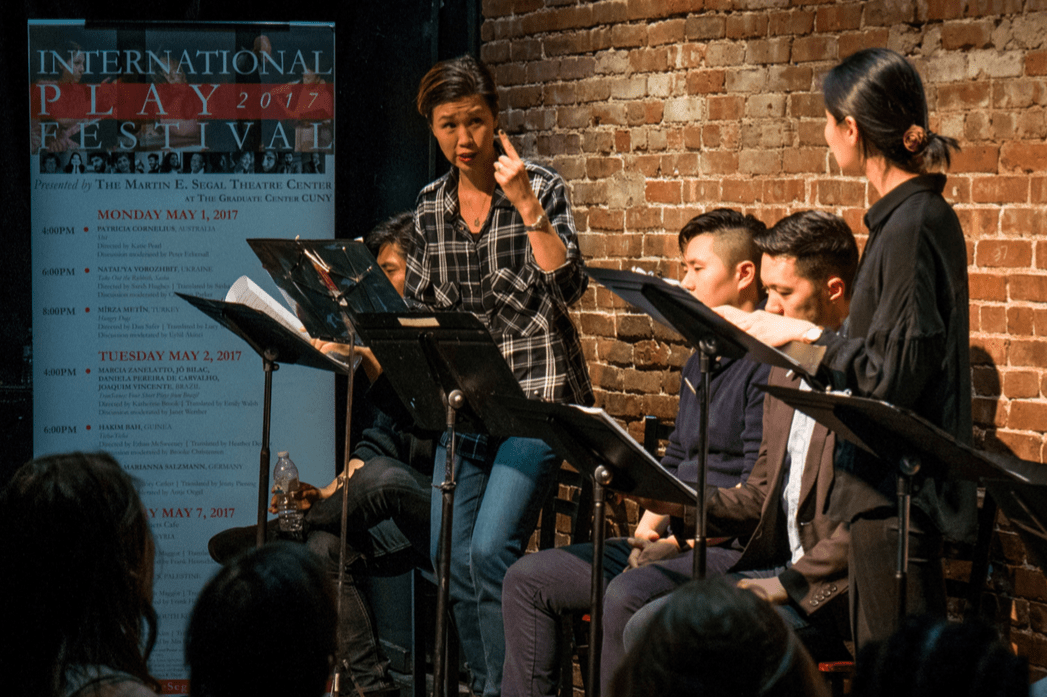
Jo Dae-Jah and Jo Mok-Rahn, Photo by Shao Wen Liang
On Sunday, May 7, Korean playwright Kim Eunsung’s Sister Mok-Rahn was given a staged reading at the Nuyorican Poets Café as part of the PEN World Voices: International Play Festival. Kim’s play was one of twelve translated plays presented at the festival, which ran from May 1 to May 7, 2017. For the New York audience, it was a rare treat to see a renowned contemporary Korean play in English. Sister Mok-Rahn, which premiered at the Doosan Arts Center in Korea in 2012, won numerous accolades including 2012 Korea Theater Award and Dong-A Theater Award for Best Play and was included in several lists of the best plays of 2012. Most recently, the play was revived at the Doosan Arts Center from March to April 2017.
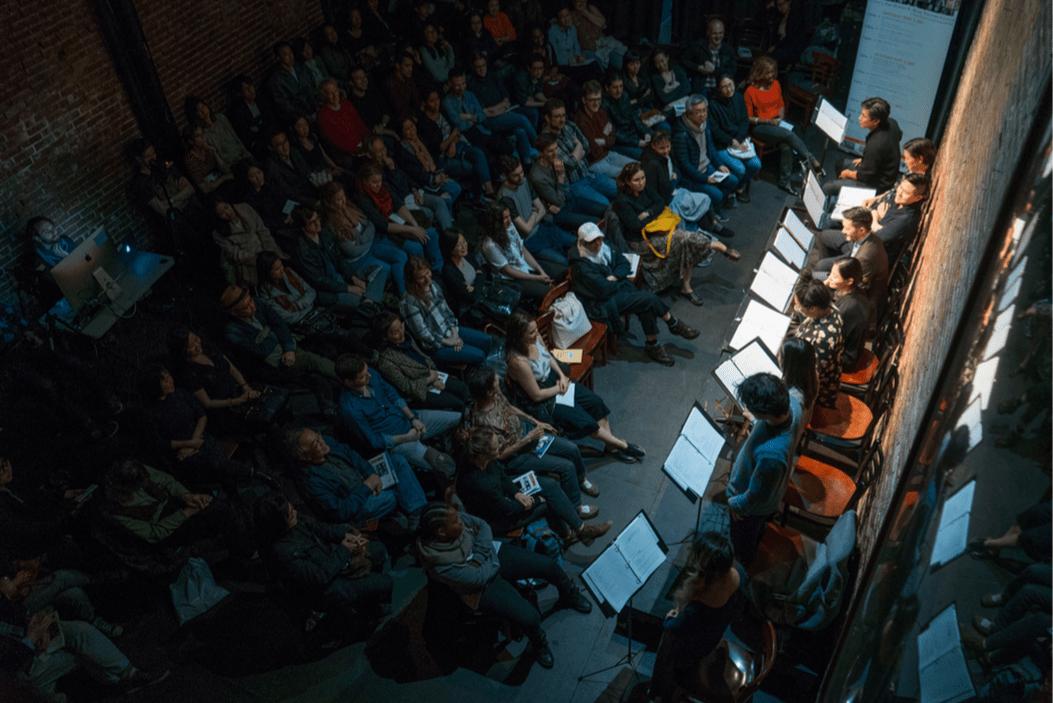
Nuyorican Poets Cafe, Photo by Shao Wen Liang
Sister Mok-Rahn centers on the ordeals and romances of North-Korean defector Jo Mok-Rahn, an elite Accordion player from Pyongyang. She seeks to return to North Korea to see her parents. To make money for this trip, Jo becomes a caretaker for Taesan, an unemployed history scholar who is suffering from depression over his recent romantic breakup. In addition to Taesan, Jo gets entangled with his mother Jo Dae-jah, who runs a brothel to earn money to raise her children: his younger brother Taegang, a philosophy professor facing the imminent loss of his job: and his sister Taeyang, a novelist-turned-film writer. As Jo navigates her way through South Korean culture and capitalism, love blooms under unexpected circumstances, and desires and ideologies clash.

Jo Mok-Rahn and Yoo Mok-Rahn, Photo by Shao Wen Liang
For the reading at PEN World Voices, the play was translated by Dayoung Jeong, a theatre artist from South Korea and an M.F.A. candidate in Dramaturgy at Columbia University. It was directed by Sunjae Kim, who is originally from South Korea and is now based in New York City. The Nuyorican Poets Café was filled with eager audience members ready for this new experience. The audience responded enthusiastically with laughter and empathetic sighs, as the play took us through Jo’s journey as a stranger in a strange land. For native Korean audience members, like myself, the play was also a reminder of how the division of North and South Korea influenced individuals regardless of ideology, social status, or gender. An American audience member, Anne Hamilton, a veteran New York City dramaturg, recalls her experience:
I was very excited to see a freshly-translated and directed Korean play. It was only the second one I have seen in NYC (the first being WALKABOUT YEOLHA by Sam-Shik Pai produced by Columbia University School of the Arts six years ago). In the large cast, most of the actors portrayed several roles. I didn’t know what to expect, and what I experienced was a lively, highly entertaining reading. What I saw and heard opened my eyes about 21st-century life in both countries.
I really appreciated both the substance and the structure of the play, and the expert direction and actor portrayals surpassed my expectations. Mr. Kim proved himself to be a skilled dramatist, portraying many scenes of life in various social and national settings in short, rapid-fire scenes. I was very emotionally invested in the characters, especially the North Korean protagonist Sister Mok-Rahn, who has been forced by circumstance to flee her country overnight, and finds herself at the mercy of a South Korean family desperately trying to hang on to its prosperity. That she is used as a means of furthering prosperity and then discarded brings me to conclude that the American and Korean societies are quite the same in many ways, after all. Still, her betrayal was unexpected and moving and made me begin to examine my presuppositions about Koreans in the two countries.
The English translation felt very fresh to me. Mr. Kim truly entertained me with his use of high and low diction, coming from the mouths of a large variety of characters, including the musician-defector, a brothel-owning mother, her seriously ill son, brothel workers, a human smuggler, and a professor, among others. The multitude of voices and dictions, and unexpected, yet organic plot twists, left me eager to view this play in full production, and also to read further works by Mr. Kim.
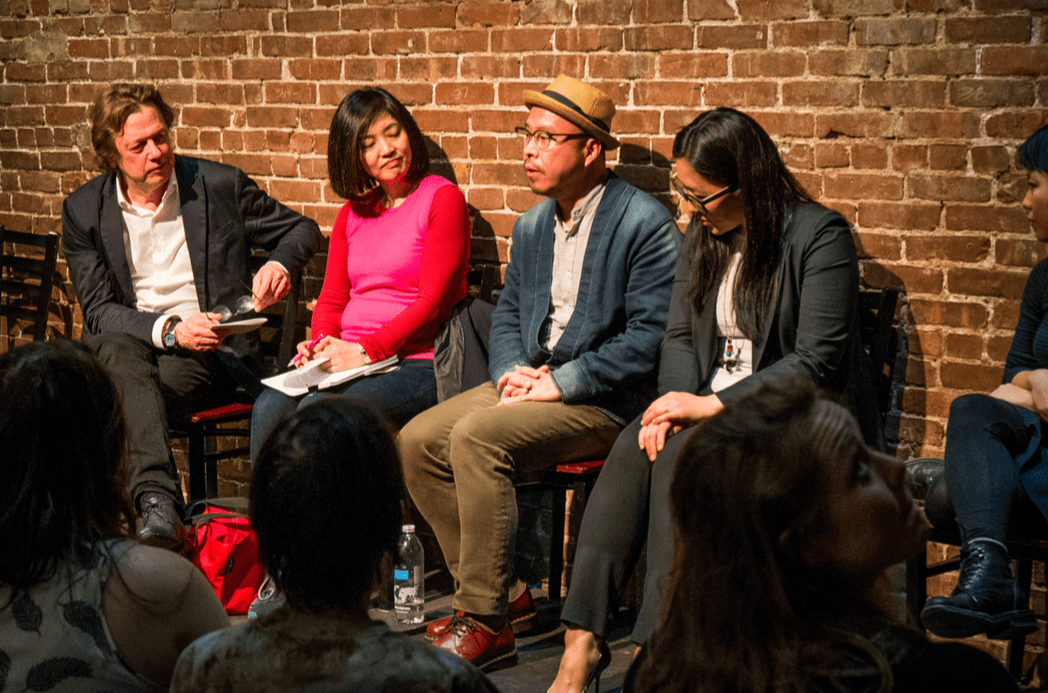
Frank Hentschker (Executive Director and Director of Programs, Martin E. Segal Theatre Center Theatre), Mia Chung (Discussion Moderator), Eunsung Kim (Playwright), Ji Hyon Yuh (Event Translator), Photo by Shao Wen Liang
At the talkback, the playwright Kim Eunsung said that it was South Korea’s less-than-successful national effort to accommodate North Korean defectors in the mid-1990s that sparked his interest in exploring the issue of the North-South Korean relationship. Contrary to the commonplace portrayal of a North Korean defector as poor and dejected, Kim was keen on presenting a North Korean elite who could stand up to the capitalist forces of South Korea. The perspective of a well-educated North Korean defector presents a critical lens to contemporary South Korean culture and values in this play. Kim expressed his gratitude to the audience for staying focused and engaged for the whole running time of two hours. He was intrigued that the points in the play that generated strong responses in South Korea received similar responses in the US. One thing he regretted was that the story he brought to America was about the sad state of the divided Koreas. He expressed his hope that he would like to meet his New York audience again with a more hopeful story about Korea. Part II of this article will contain interviews with the playwright, translator, and director.
Martin E. Segal Theatre Center’s Youtube Channel of the Staged Reading:
This post was written by the author in their personal capacity.The opinions expressed in this article are the author’s own and do not reflect the view of The Theatre Times, their staff or collaborators.
This post was written by Walter Byongsok Chon.
The views expressed here belong to the author and do not necessarily reflect our views and opinions.

